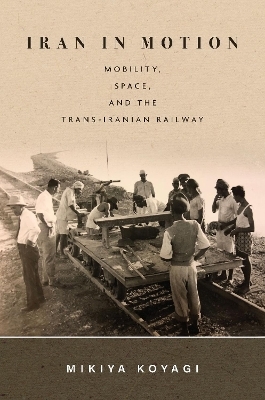
Iran in Motion
Mobility, Space, and the Trans-Iranian Railway
Seiten
2021
Stanford University Press (Verlag)
978-1-5036-1313-3 (ISBN)
Stanford University Press (Verlag)
978-1-5036-1313-3 (ISBN)
Completed in 1938, the Trans-Iranian Railway connected Tehran to Iran's two major bodies of water: the Caspian Sea in the north and the Persian Gulf in the south. Iran's first national railway, it produced and disrupted various kinds of movement—voluntary and forced, intended and unintended, on different scales and in different directions—among Iranian diplomats, tribesmen, migrant laborers, technocrats, railway workers, tourists and pilgrims, as well as European imperial officials alike. Iran in Motion tells the hitherto unexplored stories of these individuals as they experienced new levels of mobility.
Drawing on newspapers, industry publications, travelogues, and memoirs, as well as American, British, Danish, and Iranian archival materials, Mikiya Koyagi traces contested imaginations and practices of mobility from the conception of a trans-Iranian railway project during the nineteenth-century global transport revolution to its early years of operation on the eve of Iran's oil nationalization movement in the 1950s. Weaving together various individual experiences, this book considers how the infrastructural megaproject reoriented the flows of people and goods. In so doing, the railway project simultaneously brought the provinces closer to Tehran and pulled them away from it, thereby constantly reshaping local, national, and transnational experiences of space among mobile individuals.
Drawing on newspapers, industry publications, travelogues, and memoirs, as well as American, British, Danish, and Iranian archival materials, Mikiya Koyagi traces contested imaginations and practices of mobility from the conception of a trans-Iranian railway project during the nineteenth-century global transport revolution to its early years of operation on the eve of Iran's oil nationalization movement in the 1950s. Weaving together various individual experiences, this book considers how the infrastructural megaproject reoriented the flows of people and goods. In so doing, the railway project simultaneously brought the provinces closer to Tehran and pulled them away from it, thereby constantly reshaping local, national, and transnational experiences of space among mobile individuals.
Mikiya Koyagi is Assistant Professor of Middle Eastern Studies at the University of Texas at Austin.
Introduction
1. Building a Transimperial Infrastructure
2. The Road to Salvation
3. Nationalizing the Railway
4. Redirecting Mobilities
5. Death on the Persian Corridor
6. Workers of the Victory Bridge
7. Traveling Citizens
Conclusion
| Erscheinungsdatum | 13.04.2021 |
|---|---|
| Zusatzinfo | 12 halftones, 2 maps, 1 table |
| Verlagsort | Palo Alto |
| Sprache | englisch |
| Maße | 152 x 229 mm |
| Themenwelt | Sachbuch/Ratgeber ► Geschichte / Politik ► Allgemeines / Lexika |
| Natur / Technik ► Fahrzeuge / Flugzeuge / Schiffe ► Schienenfahrzeuge | |
| Geisteswissenschaften ► Geschichte ► Allgemeine Geschichte | |
| Geisteswissenschaften ► Geschichte ► Regional- / Ländergeschichte | |
| Geschichte ► Teilgebiete der Geschichte ► Wirtschaftsgeschichte | |
| ISBN-10 | 1-5036-1313-5 / 1503613135 |
| ISBN-13 | 978-1-5036-1313-3 / 9781503613133 |
| Zustand | Neuware |
| Informationen gemäß Produktsicherheitsverordnung (GPSR) | |
| Haben Sie eine Frage zum Produkt? |
Mehr entdecken
aus dem Bereich
aus dem Bereich
Das Beste aus Stadt und Land.
Buch | Softcover (2024)
VUD Medien (Verlag)
12,00 €
Buch | Softcover (2024)
hidden europe publications (Verlag)
26,15 €
die visuelle Chronik der Schienenfahrzeuge
Buch | Hardcover (2024)
DK Verlag Dorling Kindersley
34,95 €


